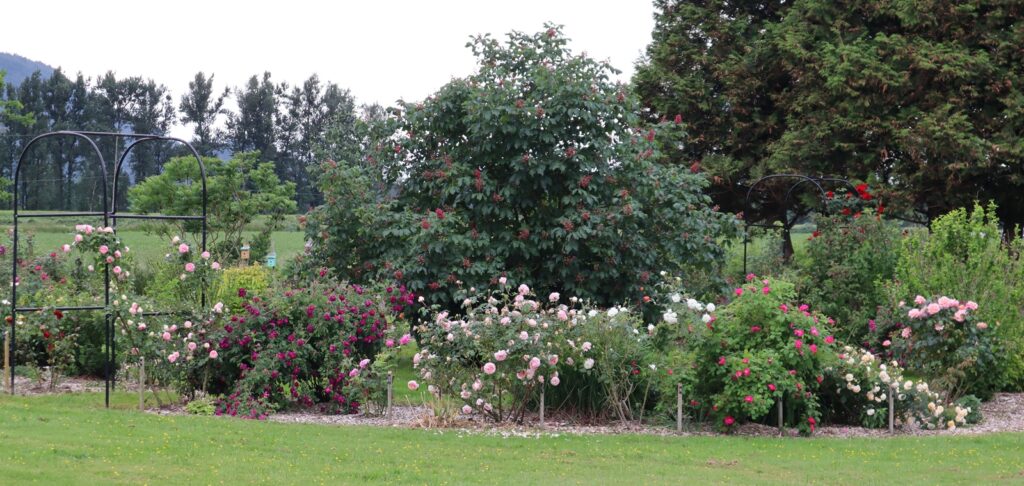We’re Jason and Lisa, and about fifteen years ago, we took a leap of faith and bought a small acreage on Nicomen Island. Money was tight, the girls were young, the learning curve was steep, and the property needed a lot of work. In those early years, it was hard to see what Fraser Valley Rose Farm might become, but the vision was already taking shape.
To keep things going, we held onto our day jobs, but from the moment we sold our first plants from a folding table at the farmers market, we knew we weren’t part of the “9 to 5” world anymore. It took me nearly a decade to finally hand in my resignation, and now, I couldn’t be more excited to share our little farm with you.
Whether you’re visiting through YouTube or we get the chance to meet in person, Lisa and I are grateful for your support. We couldn’t do this without you—and honestly, we wouldn’t want to.

Our Plants
Mainly, we sell roses and companion plants for the local market. I know this can be a bit disappointing for viewers and potential customers from farther away. We do offer a mail-order selection of smaller roses and perennials within Canada—now sold through our other online store Rose Farm Canada—but we’re not in a rush to expand beyond the local market in a big way. Give me a minute to explain, and I think you’ll understand why.
Growing is local—or at least it should be. The plants and growing practices that thrive in my northern Pacific Coast climate may not work as well in regions with different temperatures, day lengths, rainfall, or soil conditions. In some places, soil pathogens make grafted roses a necessity, while all of our roses are propagated and grown on their own roots. One thing that stuck with me from my time at the farmers market is the idea that large-scale production and long-distance shipping aren’t always the most sustainable or sensible answer. Could there be a great local rose grower in New Brunswick, perfectly suited to their climate? Absolutely—and in fact, there is! We don’t need to be the biggest supplier in any market. In my view, the hobby is best served by more local growers supporting their own communities.
That said, I know some of the roses we’ve collected are hard to find, and we’ll do our part to keep them in circulation. If that means expanding our mail-order offerings in a thoughtful way, we’ll definitely consider it.
As mentioned, we propagate our roses on their own roots from our collection of mother stock. We also bring in a small percentage—about 5%—from other suppliers to round out our selection. One of our goals this year is to expand our variety of annuals, perennials, and shrubs—ideal companions for roses, which are, after all, very social plants in the garden.
We maintain our plants with minimal spraying (mainly sulfur and baking soda) and absolutely none of the harsh chemicals. My family lives here, so that’s non-negotiable for me. So if you notice a little blackspot or a few aphids on our roses, now you know why.
Our Business
I’ll fill in details in the other sections of the site as we get into the season, but here’s an overview of what you can expect to see from us over the coming season:
- In February we’ll evaluate the own-root roses and perennials in 9cm/4″ liners, and add them to the online store for shipping across Canada.
- At the beginning of March we expect to open our farm on Fridays and Saturdays for retail sales. On-farm shopping now includes three greenhouses for roses, perennials and shade-lovers as well. Customers are welcome to roam our gardens and stock roses for inspiration.
- We’ll be adding loads of roses and perennials to the online store for local curbside pickup. This has been a popular and convenient option for customers to shop our online store in advance of a Saturday visit to pick up their pre-paid order.
- We’ll be adding in-person events (speaking engagements, plant sales, etc) as they are confirmed.
- This past year we remained open in a more “relaxed” capacity through the fall and winter, and I expect we’ll do the same this coming season.
- Believe it or not, Youtube has become a serious part of our business. I’ll try to post videos at least weekly even during the selling season. I already have some great road trips and topics lined up.
Thank You
I probably can’t say it enough times. Our local customers, mail order customers and viewers on Youtube have helped to make this dream possible. Some people have questioned why we would allow visitors so much access to our property and gardens. This is the reason: your interest and support has shaped this property, and I’d love for you to see the changes as they happen.
